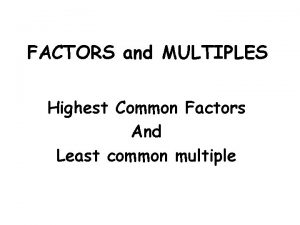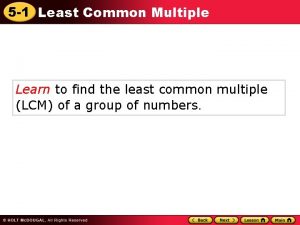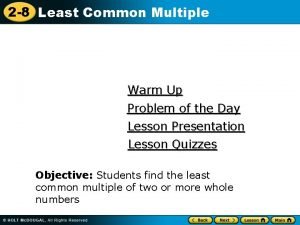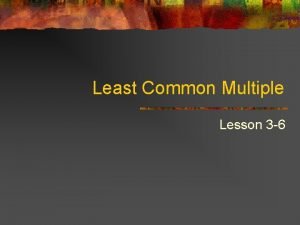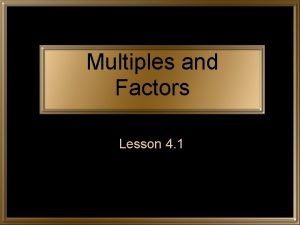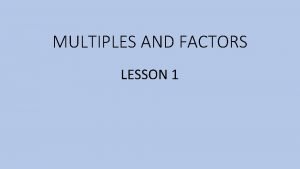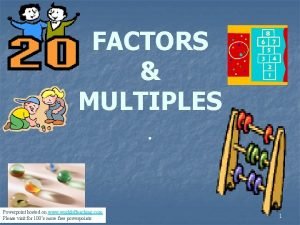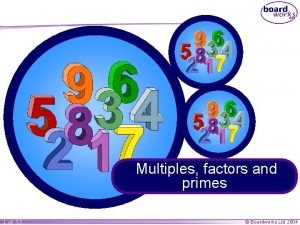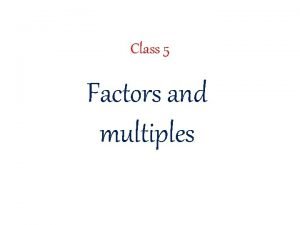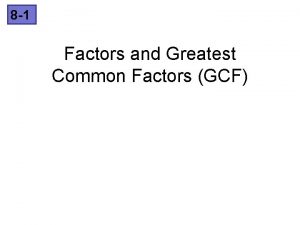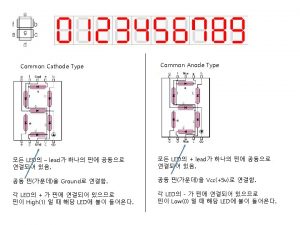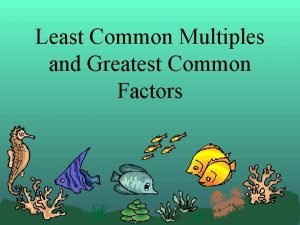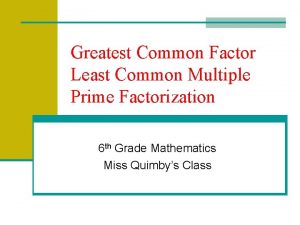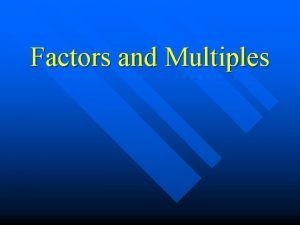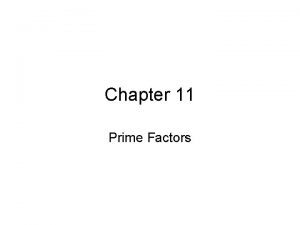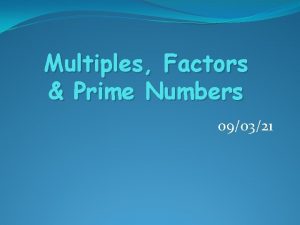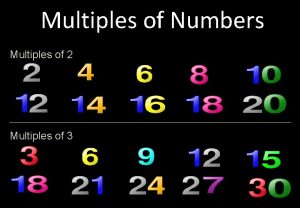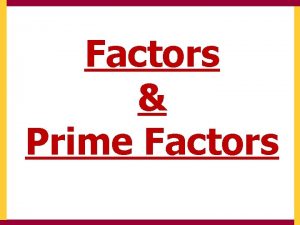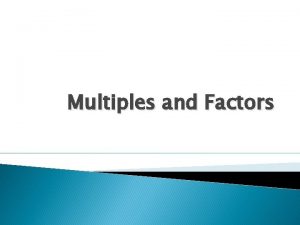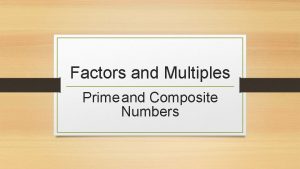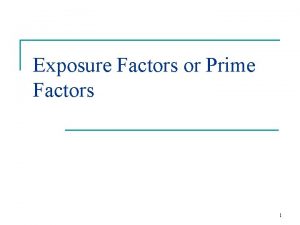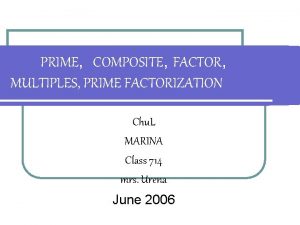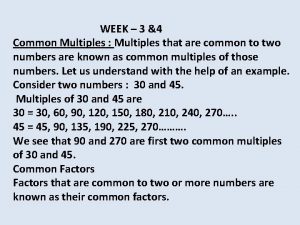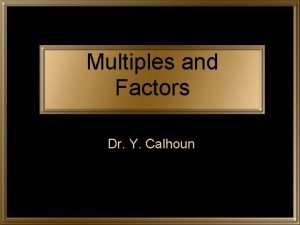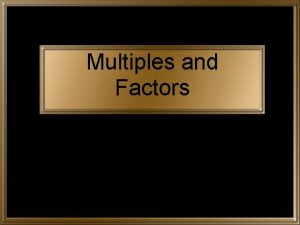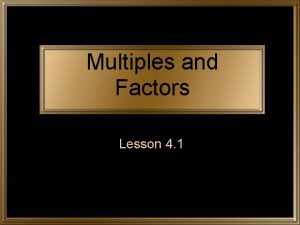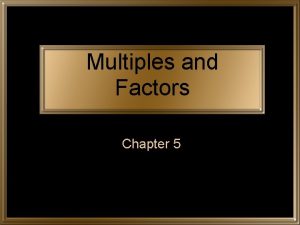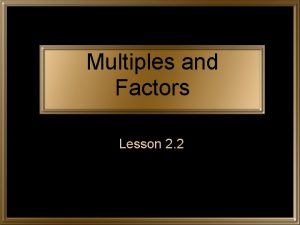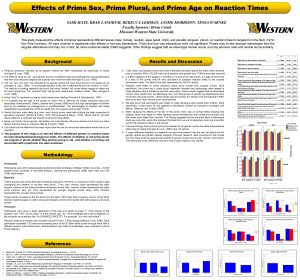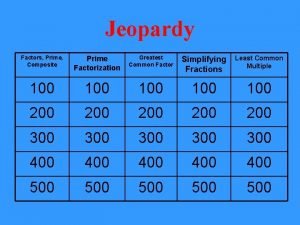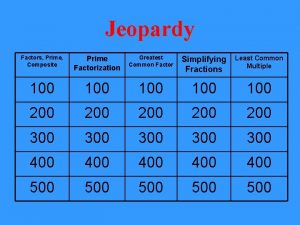Factors and Multiples Factors Prime Factors Common Factors




























- Slides: 28

Factors and Multiples Factors Prime Factors Common Factors and Highest Common Factor (HCF) Multiples Common Multiples and Lowest Common Multiple (LCM)

1. Factors of a given whole number are the numbers that can divide the given whole number exactly. e. g. Factors of 12 = 1, 2, 3, 4, 6, 12 Factors of 19 = 1, 19

Example List all the factors of each of the following numbers. 1 12 The factors of 12 are 1, 2, 3, 4, 6 and 12.

2. 28 The factors of 28 are 1, 2, 4, 7, 14 and 28. 3. 17 The factors of 17 are 1 and 17. - The number 1 is a factor of all the whole numbers. - Every number is a factor of itself.

Example 2 Determine whether 9 is a factor of each of the following numbers. (a) 63 (b) 1963 solution An exact division (a) 63 9 = 7 Therefore, 9 is a factor of 63. (b) 1963 9 = 218 remainder 1 Therefore, 9 is not a factor of 1963. Try Question in exercise Not an exact division

Exercise 1. List all the factors of each of the following numbers. (a) 10 (b) 13 (c) 36 (d) 52 (e) 75 (f) 84 (g) 100 (h) 125 2. Determine whether each of the following numbers is a factor of the number in brackets. (a) 6 (54) (b) 8 (68) (c) 12 (102) (d) 13 (156)

2. Prime Factors Prime factors of a given whole number are the factors of the given whole number which are also prim numbers. e. g. Prime factors of 12 = 2, 3

Example 1 Find all the prime factors of 20. e. g. 2 )20 2 )10 5) 5 1 Keep dividing by the smallest prime factor until you get 1. Therefore : The prime factors of 20 are 2 and 5.

Hot tips The factor tree method can also be used to find the prime factors of a given whole number. For example. 20 2 10 2 x 5 From the factor tree method, we have 20 = 2 x 5. Therefore, the prime factors of 20 are 2 and 5.

Exercise 1. Find all the prime factors of each of the following numbers. (a) 12 (b) 15 (c) 28 (d) 42 (e) 231 (f) 330 2. Express each of the following numbers as a product of its prime factors. (a) 18 (b) 30 (c) 57 (d) 78 (e) 255 (f) 441

3. Common Factors and Highest Common Factor (HCF) A common factor is number that is a factor of two or more numbers. e. g. Common factors of 6 and 18 = 1, 2, 3, 6

Example 1 18 and 32 Factors of 18 : 1 , 2 , 3 , 6 , 9 , 18 Factors of 32 : 1 , 2 , 4 , 8 , 16 , 32 The common factors of 18 and 32 are 1 and 2 Example 2 4, 8 and 16 Hot tips The number 1 is a common factor of all whole numbers. Factors of 4 : 1 , 2 , 4 Factors of 8: 1 , 2 , 4 , 8 Factors of 16 : 1 , 2 , 4 , 8 , 16 The common factors of 4, 8 and 16 are 1, 2 and 4

Exercise 1. Find all the common factors of each of the following sets of numbers. (a) 21 and 36 (b) 42 and 63 (c) 8, 12 and 16 (d) 30, 60 and 800

A highest common factor (HCF) is the greatest common factor of two or more numbers. Method 1: List all factors Example 1 Find the highest common factor of 4, 8 and 16 on s ti olu Factors of 4 : 1 , 2 , 4 Factors of 8: 1 , 2 , 4 , 8 Factors of 16 : 1 , 2 , 4 , 8 , 16 The common factors of 4, 8 and 16 are 1, 2 and 4 HCF of 4, 8 and 16 are 4

Exercise Find the HCF of each of the following sets of numbers by listing all the factors. (a) 18 and 24 (b) 32 and 80 (c) 6, 16 and 24 (d) 35, 56 and 84

Method 2: Prime factorisation Example 2 Find the highest common factor of 12 and 18 solution 12= 2 x 3 18 = 2 x 3 x 3 2 The HCF of 12 and 18 is 2 x 3 = 6 Identify the prime factors which are common factors of both numbers.

Exercise Find the HCF of each of the following sets of numbers using prime factorisation. (a) 42 and 54 (b) 56 and 98 (c) 6, 24 and 84 (d) 30, 55 and 70

1 Method 3: Algorithm Example 3 Find the highest common factor of 18, 27 and 36 solution 36 27 18 ( 3 12 9 6 ( 3 4 3 2 Stop dividing when there are no more common factors except 1. The HCF of 18, 27 and 36 is 3 x 3 = 9 Multiply all the divisors.

Exercise Find the HCF of each of the following sets of numbers using algorithm. (a) 44 and 66 (b) 45 and 90 (c) 9, 21 and 33 (d) 48, 64 and 80

4. Multiples A multiple of a given whole number is the product of itself and another non – zero whole number. For example, multiples of 3: 3 x 1=3 3 x 2=6 3 x 3=9 : : : Multiples of 3 = 3, 6, 9, 12, 15, …

5. Common Multiples and Lowest Common Multiple (LCM) A common multiple is a multiple of two or more whole numbers. e. g. Common multiples of 2 and 3 = 6, 12, 18, …

Exercise List the first three common multiples of each of the following sets of numbers. (a) 3 and 4 (b) 2 and 5 (c) 2, 3 and 4 (d) 4, 6 and 8

A lowest common multiple (LCM) of two or more numbers is the smallest common multiple of these numbers. Method 1: List all multiples Example 1 Find the lowest common multiple of 4 and 6 solution Multiples of 4 : 4, 8, 12, 16, 20, 24, … Multiples of 6 : 6, 12, 18, 24, … The LCM of 4 and 6 is 12.

Exercise Find the LCM of each of the following sets of numbers by listing all the multiples. (a) 4 and 5 (b) 8 and 12 (c) 2, 4 and 9 (d) 18, 24 and 48

Method 2: Prime factorisation Example 2 Find the lowest common multiple of 4 and 6 solution 4=2 x 2 6= 2 x 3 Ensure that all the factors are prime numbers. 2 x 2 x 3 The LCM of 4 and 6 is 2 x 3 = 12

Exercise Find the LCM of each of the following sets of numbers using prime factorisation. (a) 7 and 9 (b) 25 and 30 (c) 10, 20 and 35 (d) 18, 24 and 32

Method 3: Algorithm Example 3 Find the lowest common multiple of 6, 8 and 30 Keep dividing by the smallest prime 2 ) 6 8 30 factor until you get 1. Carry down 3 ) 3 4 15 the numbers that are not divisibled 4)1 4 5 by the prime numbers. 5)1 1 5 Multiply all the divisors. 1 1 1 LCM of 6, 8 and 30 = 2 x 3 x 4 x 5 = 120 solution

Exercise Find the LCM of each of the following sets of numbers using algorithm. (a) 4 and 14 (b) 36 and 82 (c) 6, 16 and 64 (d) 21, 28 and 70
 Factors of 60 and 72
Factors of 60 and 72 What are the factors for 54
What are the factors for 54 Multiples of 9 and 21
Multiples of 9 and 21 Lesson 2-1 greatest common factor
Lesson 2-1 greatest common factor Common multiple of 6 and 9
Common multiple of 6 and 9 Lcm of fractions shortcut
Lcm of fractions shortcut Lowest common multiple of 6 and 8
Lowest common multiple of 6 and 8 What is the lcm of 7 and 14
What is the lcm of 7 and 14 Highest common factor of 12 and 42
Highest common factor of 12 and 42 What are the first five multiples of 13
What are the first five multiples of 13 Jeff bezos prime video prime
Jeff bezos prime video prime Gcf of 48 56 and 72
Gcf of 48 56 and 72 Factors and multiples puzzle
Factors and multiples puzzle Multiples of 4
Multiples of 4 All multiples of 3
All multiples of 3 Factors and multiples class 4 ppt
Factors and multiples class 4 ppt Factors multiples and primes worksheet gcse
Factors multiples and primes worksheet gcse Factors and multiples in real life
Factors and multiples in real life Factors of 53
Factors of 53 Factors and multiples class 5
Factors and multiples class 5 Greatest common factor of monomials
Greatest common factor of monomials Factors if 7
Factors if 7 Gcf monomials calculator
Gcf monomials calculator Greatest common factor prime factorization
Greatest common factor prime factorization Common anode and common cathode
Common anode and common cathode Find the lcm of 16 24 36 and 54
Find the lcm of 16 24 36 and 54 Lcm using prime factorization worksheet
Lcm using prime factorization worksheet How to find the prime factorization
How to find the prime factorization Cake method lcm
Cake method lcm

